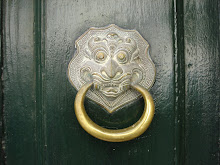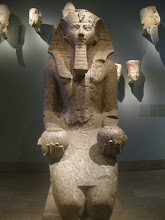Okay, so where were we? Oh yes, I was filling out the form the young Israeli border control officer gave me.
Another female border control officer--a few years older than the first one--came up to me, asked me to move to another waiting area and also be sure to write down the ID number of my boyfriend on the form I was filling out. I called Tarek who was already through the control, and we figured they already know everything about him so giving them his ID number wouldn't really make a difference. I wrote it down for them.
After quite some time, the woman came back, took the form, and left me waiting again. And then finally, she came with my passport and papers in hand, sat down beside me and started interrogating me.
Woman: "You were here in 2008."
Me: "Yes."
Woman: "You were here for three months and we know you weren't here as a tourist. We know what you did here because people you thought were friends have told us, so there is no use to lie."
Me: "Yes, I'm aware of that." I know how they work. Thinking: if they know everything already, why bother interrogating me?
Then she changed the subject completely (probably some kind of interrogation strategy they get taught) and started asking me about what I'm doing in Ramallah. I told her everything. She asked me about my boyfriend and about our future plans together. She asked me if I was Jewish (which I'm not). By way of asking more questions, she then came with the following assumptions:
1) I'm Christian (which I'm not).
2) Tarek and I will get married, and when we do, we will have problems because he is Muslim and I'm not.
3) We will have children, and when we do, we will have problems because he is Muslim and I'm not.
Then she changed the subject again. Asked me about my studies. Wanted to know the topic of my Masters thesis in detail. I told her it was on the UN and the Israeli-Palestinian conflict, but
kind of felt it would be better if I left out the main assumption in my thesis (namely that Israel is equal to, if not worse than, Apartheid South Africa, and that it is therefore puzzling that the UN Security Council will not call for sanctions against Israel the way they did against South Africa).
Anyway, she switched subjects again, asked me about my family. Then she came back to 2008.
Woman: "What did you do here in 2008?" She added, "I know you were in Jenin."
(Flashback to the interrogations in 2008 at Tel Aviv airport: both coming and going, I denied ever having plans on going to or ever having been to Jenin. I said I would visit Israel only, maybe Bethlehem).
Me: "Yes, I was in Jenin." No point of lying anymore.
Woman: "What did you do in Jenin?"
I told her. But surprisingly enough, she was more interested in what I had done in Ramallah in 2008. Surprisingly because Jenin is where the vast majority of the martyrs/suicide bombers came from during the second Intifada.
She asked me who I knew in 2008. I gave her names. She wanted to know how I met one of them.
Me: "Through Facebook."
Woman: "You're lying."
Me: "No, I met him on Facebook." Why would I lie about Facebook?
Woman: "You're lying."
Me: "No. I met him on Facebook. Then we met in real life."
Woman: "I know you're lying."
Me, not being able to contain my irritation: "I don't know what else to say, I'm telling you the truth."
Woman: "Give me his phone number."
I gave it to her, knowing they probably monitor his phone already anyway.
She kept asking me questions about Ramallah, about the political activism I was engaged in, the demonstrations I attended. I denied all involvement in political activism. She told me I was lying. Over and over again. But I wasn't. I don't attend demonstrations because of the risk of being shot at by Israeli soldiers and/or deported.
(The loyal reader will remember that I did attend two manifestations in Ramallah, but they were quiet and completely without (official) Israeli military involvement).
She then switched again and wondered where Tarek and I will live. Will we stay here? The first time she asked me, I said I don't know. The second time she asked me, after having asked some other questions in between, I said we haven't decided. The third time she asked me, I had lost the little patience I still had and went: "No, we want to
move."
Woman: "Why?"
Me: "Because it's such a hassle traveling in and out of the country!"
Woman: "Why?"
Me: "Because of
this!"
Woman: "But this is the first time this happens to you."
Me, going bonkers inside because she kept provoking me by telling me that I'm lying and making up things that weren't true: "No it's
not the first time this happens to me."
Woman: "Yes it is."
Then I thought it's probably better if she thinks it's the first time I'm being interrogated, seeing as how I lied about Jenin and pretty much everything else the first two times.
She kept asking me questions. Why am I here and not in Sweden? Why do I care about Palestinians? Why don't I worry about my own people? Why do I want to work in humanitarian affairs and development? (As if that's something bad).
Finally I had enough and said: "Look, if you want to deport me, then go ahead. Let me just go and get my bags and then I'll leave."
Woman: "This might happen."
And then she left me again. For almost three hours. I knew her threat was most likely empty, and I was sure it was a only a matter of time before I would be let inside. But the problem was that I didn't know how long it would take. It was Friday and Shabbat would start soon, would they send me back to Jordan and tell me to come back tomorrow?
The waiting area was full of people, mostly Palestinians, waiting to be questioned, waiting to have their luggage searched. Old, old women, young women with newborn babies on their arms, mothers with small children... everybody is a security threat in Israel's eyes.
I dared only take one photo with my cell phone. You can see the waiting area, with kids waiting for hours for their parents who get taken to separate interrogation rooms inside; and people standing in line in the background, waiting to go through the last two passport controls after they have had their passports stamped or their visas granted.
All this time I was sitting in this area, without anything to drink or eat (remember we had landed at two in the morning, had hardly slept and hadn't eaten since we had the food served on the plane the night before), Tarek was waiting outside in the scorching hot sun, having gotten through the border control at around 9 in the morning.
He called me every two minutes to check on me and ask if there were any news.
Finally the woman came back, only to tell me to wait in another waiting area. This was at around one in the afternoon on a Friday. The Israelis working there were getting nervous about getting home in time for Shabbat, and so things were beginning to move faster. An Israeli man in military uniform called out my name and asked me to step aside with him.
He started: "What is the purpose of your visit?"
Without an ounce of patience left, I went: "Come
on, I already answered this twice!"
He said that he knew, but he had to ask me. So he asked me question after question, and after protesting some more, saying they even had my answers in
writing, I answered them again because I had to if I wanted them to stamp my passport. I gave Tarek's ID number again, I gave him my address, my work details, everything. Finally he said, "I can only give you a three-month visa, then you will have to go to Beit-El to have it extended. Your passport will be ready in 15 minutes, they will call your name."
"Oh okay thanks," I said, a little taken aback by his almost-excuse for not being able to give me more than three months.
After maybe a half hour, they called my name and I finally got my passport back, complete with an Israeli stamp allowing me to stay for three months.
It was two in the afternoon. I went through the last two passport controls, found my bags among the hundreds of other bags thrown in a heap on the floor after the Israeli security check, and finally got through to the other side.
I burst out in tears. Relieved and angry at the same time. And more committed to helping the Palestinians than ever.
























